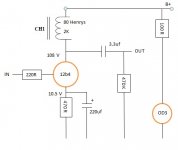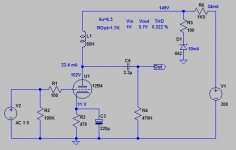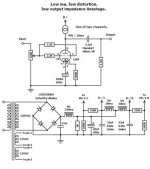Ever since I built this linestage I've noticed a distinct lack of bass. I am driving a leak stereo 20 that has input impedance of 1M, I am also trying a Rotel solid state that has input impendance of 33K.
Alot of the bottom end reappears when I drive the Leak, which leads me to belive I have a problem with the output impedance of the 12b4 linestage. I have heard this can dramtically affect the bass response. Although it is still not great and varies from song to song and at what volume I'm litening to the music at. There is almost no bass at low volumes.
I've done a calculation on the the final rc filter of the circuit and my coupling cap (3.3uf) should be big enough. I hope so too as these are huge ruissian PIO caps that were difficult to fix so I'm hoping they do not require changing.
I,m a noob and hoped that someone may take a glance at my schematic and notice an obvious problem....
Stuart
(Not quite certain of the value of the anode choke and I have 149 Volts at the B+ due to the OD3 regulator)
Alot of the bottom end reappears when I drive the Leak, which leads me to belive I have a problem with the output impedance of the 12b4 linestage. I have heard this can dramtically affect the bass response. Although it is still not great and varies from song to song and at what volume I'm litening to the music at. There is almost no bass at low volumes.
I've done a calculation on the the final rc filter of the circuit and my coupling cap (3.3uf) should be big enough. I hope so too as these are huge ruissian PIO caps that were difficult to fix so I'm hoping they do not require changing.
I,m a noob and hoped that someone may take a glance at my schematic and notice an obvious problem....
Stuart
(Not quite certain of the value of the anode choke and I have 149 Volts at the B+ due to the OD3 regulator)
Attachments
It's the first suspect !. . .
(Not quite certain of the value of the anode choke . . .)
Yves.
Thanks everyone.
I got the anode choke from i guy selling 12b4 kits, i just can,t remember the exact values. i do remember having the same troubles before using the choke.
If i adjust the value of the resistor across the output - will this affect the output impedance? how?
I,m concerned about its inability to drive the Rotel (33k input impedance)
Also, I,ve used Ohms Law at the cathode resistor to calculate 10.5V / 470R = 22mA
Does this mean that the tube is operating at 22mA? If so - I think this ok.
However, I,m unsure if I need to bias the grid voltage? or how to do it on this preamp and I still don,t think that this is the culprit. I feel that the fact that the line stage delivers very little bass especially at lower volumes must be the impedance? but I am a mere Noob
Stuart
I got the anode choke from i guy selling 12b4 kits, i just can,t remember the exact values. i do remember having the same troubles before using the choke.
If i adjust the value of the resistor across the output - will this affect the output impedance? how?
I,m concerned about its inability to drive the Rotel (33k input impedance)
Also, I,ve used Ohms Law at the cathode resistor to calculate 10.5V / 470R = 22mA
Does this mean that the tube is operating at 22mA? If so - I think this ok.
However, I,m unsure if I need to bias the grid voltage? or how to do it on this preamp and I still don,t think that this is the culprit. I feel that the fact that the line stage delivers very little bass especially at lower volumes must be the impedance? but I am a mere Noob
Stuart
If your circuit is correct, with nothing missing, then you are relying on the source providing the DC bias for the valve grid. This is not a good idea but should not affect the bass any more than other frequencies.
If the anode choke was too low in value then this would be the same for both amps. The most likely cause for the symptoms you describe is that the output capacitor is much smaller in value than you think.
If the anode choke was too low in value then this would be the same for both amps. The most likely cause for the symptoms you describe is that the output capacitor is much smaller in value than you think.
Thanks very much euro21! I assume you put my schemtaic into software for that? really appreciated.
Can you see where I might make improvements? If it has rolled off -3dB at 30Hz - does this mean that it already started to lose volume at a higher freq than 30Hz?
I always thought that ROut was close to 600 Ohms. Now I know it's 1.7K, could I bennefit from decreasing this?
I am just not sure how to intrepret your findings - I just want more bass!! (ha)
@df96 - thanks for your input too. he output caps are definatley 3.3uf - they are huge green military ones from ebay and they say 3.3uf. Could this be wrong?
cheers Stuart
Can you see where I might make improvements? If it has rolled off -3dB at 30Hz - does this mean that it already started to lose volume at a higher freq than 30Hz?
I always thought that ROut was close to 600 Ohms. Now I know it's 1.7K, could I bennefit from decreasing this?
I am just not sure how to intrepret your findings - I just want more bass!! (ha)
@df96 - thanks for your input too. he output caps are definatley 3.3uf - they are huge green military ones from ebay and they say 3.3uf. Could this be wrong?
cheers Stuart
R4 is too small. It's only function is to discharge the O/P coupling capacitor. Refer to my version of a 12B4 preamp. It uses 1.5 MOhms in that position.
XC for 80 H. @ 20 Hz. is 10053 Ω. That can easily be too small working into the comparatively low SS power amp I/P impedance. Replace the choke with a good CCS. Then, even the nasty IHF 10 KOhm "standard" I/P impedance will not be a problem.
3.3 μF. is the absolute minimum value for the O/P coupler. IF the part is correctly labeled, replacement is unnecessary.
XC for 80 H. @ 20 Hz. is 10053 Ω. That can easily be too small working into the comparatively low SS power amp I/P impedance. Replace the choke with a good CCS. Then, even the nasty IHF 10 KOhm "standard" I/P impedance will not be a problem.
3.3 μF. is the absolute minimum value for the O/P coupler. IF the part is correctly labeled, replacement is unnecessary.
Attachments
Thanks Eli and everyone else who contributed
I will measure the output caps, I have found the bigger brothers to my caps on ebay...
4.7uF 250V PIO capacitors HI-END K75-10. Lot of 4 NEW | eBay
I will also change R4 to 1.5M
Can I just add a power resistor to my anode choke to see if I get better bass response? Not sure about the CCS on the anode yet, I'm not confident enough to build one!
cheers Stuart
I will measure the output caps, I have found the bigger brothers to my caps on ebay...
4.7uF 250V PIO capacitors HI-END K75-10. Lot of 4 NEW | eBay
I will also change R4 to 1.5M
Can I just add a power resistor to my anode choke to see if I get better bass response? Not sure about the CCS on the anode yet, I'm not confident enough to build one!
cheers Stuart
XC for 80 H. @ 20 Hz. is 10053 Ω. That can easily be too small working into the comparatively low SS power amp I/P impedance. Replace the choke with a good CCS. Then, even the nasty IHF 10 KOhm "standard" I/P impedance will not be a problem.
I don't get that.
The 80 H choke is a 10k AC load at 20 Hz; that is plenty enough for a 12B4 with its 1k5 or so Rp.
Replacing the choke by a CCS will not lower the output impedance, so there will not be better driving capacity doing that.
Reading the posts I think the choke is the suspect part; its inductance should be checked before IMO unnecessary changes to the circuit are being made.
Last edited:
Why not buy it (Cascode current source kit) from K&K audio?Not sure about the CCS on the anode yet, I'm not confident enough to build one!
K & K Audio - Lundahl Transformers, audio DIY kits and more
First watt F5 amp....maybe average sensitivity speakers...perhaps silver interconnects...typical bass rolloff system. :-(
Last edited:
The 80 H choke is a 10k AC load at 20 Hz; that is plenty enough for a 12B4 with its 1k5 or so Rp.
You're forgetting that the choke's reactance is in parallel with the I/P impedance of the downstream device. The NET load will always be less than that of any entity that contributes to the set of parallel paths. Yes, even at 1.5 MOhms, R4 makes a negative contribution.
Another issue with choke loading is the HF "peaking" that occurs. "Peaking" can be very useful, but not here. The OP's complaint about poor bass behavior dovetails all to well with gain rising as frequency rises.
You're forgetting that the choke's reactance is in parallel with the I/P impedance of the downstream device. The NET load will always be less than that of any entity that contributes to the set of parallel paths. Yes, even at 1.5 MOhms, R4 makes a negative contribution.
I am not forgetting that
Even with the 33k input impedance of the Rotel amp the net load load will be some 7k7 at 20Hz (rapidly rising to some 0.5 Meg at 1 kHz), which is a very decent load for a 12B4.
There is still no explanation for the bass roll off, presuming the choke is really 80H.
Another issue with choke loading is the HF "peaking" that occurs. "Peaking" can be very useful, but not here. The OP's complaint about poor bass behavior dovetails all to well with gain rising as frequency rises.
HF peaking does not occur with all chokes; quality chokes will show a ruler flat frequency bandwidth up to hundreds of kHz (depending on source impedance).
I question the quality of the choke; the 2k DC resistance already indicates this, and is a bad match with a low Rp tube to begin with (almost 50V DC drop across a choke is not what you want; I agree that the 50V could better be used for a CCS instead of a bad quality choke).
Based on a quality choke (with some 5 V of voltage drop at 20 mA of plate current) and a 1k cathode resistor, there is nothing wrong with the circuit.
Last edited:
"Peaking" is a natural consequence of inductive loading. XC = (2)(Π)(F)(L) Inductive reactance varies directly with frequency. Increase the load and gain goes up.
That is too simple.
The math is right, but practice is a bit different.
For example: inductance is not a frequency linear parameter; pick a socalled 80H choke and measure the inductance with a good quality meter at 100 Hz, 1 kHz and 10 kHz. With standard grain oriented silicon steel you will see the inductance drop at the higher frequencies (there you go with the math...).
Adequate inductive or CCS loading gives a gain of the triode of about mu, there is no significant difference, and up to very high frequencies (very much over 20 kHz). For triodes: check load lines and see when they become flat.
When speaking of the gain going up by increasing the load, that is generally right for pentodes.
- Status
- This old topic is closed. If you want to reopen this topic, contact a moderator using the "Report Post" button.
- Home
- Amplifiers
- Tubes / Valves
- 12b4 bass rolloff problem


